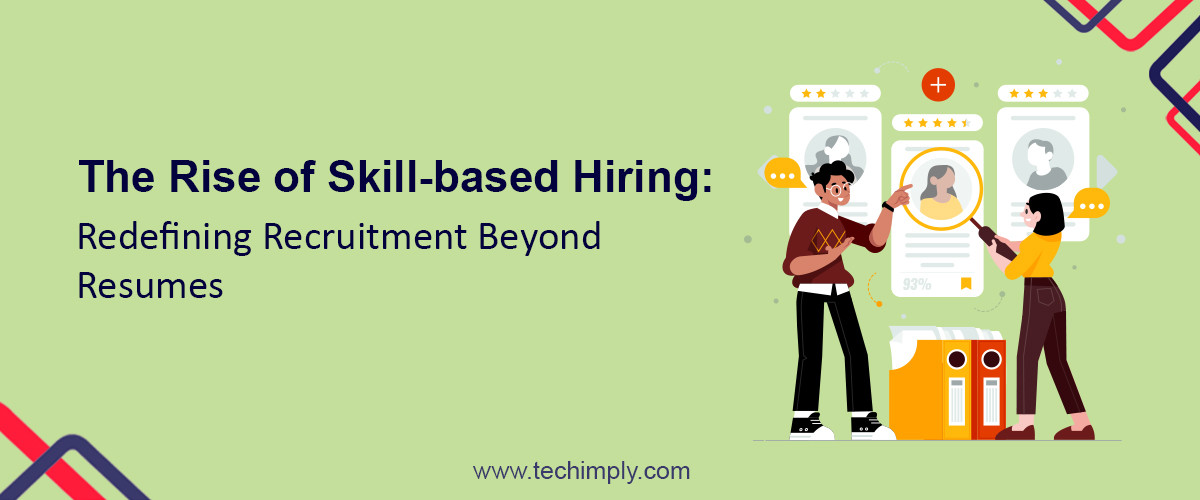Amidst the whirlwind of technological strides, dynamic market dynamics, and unprecedented global challenges, the very essence of recruiting software is undergoing a metamorphic shift. The once steadfast reliance on resumes and degrees as the quintessential markers of a candidate's fitness for a role is now surrendering to a more intricate and discerning approach: skill-based hiring.
This radical transformation resonates with the understanding that a candidate's skills, competencies, and adaptability stand as the bedrock of their potential to shine in the contours of the contemporary workplace.
As we embark on this exploration, we shall navigate the intricate realm of skill-based hiring, unearthing its paramount significance, tangible ramifications, and profound role in redefining the entire recruitment tapestry.
The Importance Of Skill-Based Hiring
-
Moving Beyond Resumes: The limitations of resume-based evaluations have become increasingly evident. Resumes offer a snapshot of a candidate's educational background, work history, and achievements, yet they often fail to capture the depth and breadth of their capabilities. corporate headshots, however, can provide a more holistic view of candidates, allowing recruiters to gauge their professionalism and presence. Skill-based hiring transcends this limitation by considering a candidate's practical competencies, soft skills, and growth potential. It offers a more holistic view of a candidate's readiness to take on challenges and contribute effectively within a rapidly evolving work environment.
-
Adaptability In Modern Workplaces: In a world where change is the only constant, the ability to adapt and learn quickly has become a coveted skill. Skill-based hiring places a spotlight on candidates' adaptability and learning agility. Organizations can build better teams to navigate industry shifts, technological advancements, and changing consumer preferences by prioritizing candidates who demonstrate a willingness and ability to acquire new skills.
-
Mitigating Bias And Fostering Inclusivity: Skill-based hiring introduces objectivity into the recruitment process. Traditional hiring methods often unintentionally favour candidates with certain educational pedigrees or backgrounds. By focusing on practical skills and demonstrated abilities. skill-based hiring reduces the potential for unconscious bias and promotes diversity and inclusivity. This approach allows organizations to tap into a wider range of talent, fostering creativity and innovation through diverse perspectives. Mitigating bias and promoting inclusivity are essential goals in modern recruitment, and recruitment marketing platforms play a key role in achieving them.
-
Showcasing Practical Competencies: By emphasizing practical assessments, skill-based hiring takes recruitment beyond theoretical qualifications. These skill-based assessments can take various forms, such as practical tests, case studies, simulations, and role-playing exercises. These methods accurately represent a candidate's problem-solving skills, critical thinking abilities, and teamwork dynamics. By evaluating candidates' abilities in real-world scenarios, organizations gain insights into how they will perform in actual work situations.
-
Nurturing Continuous Growth And Development: The focus on skills doesn't end with the recruitment process; it extends into an employee's career journey. Skill-based hiring fosters a culture of continuous learning and growth. Employees are encouraged to refine and acquire new skills, aligning their personal development with organizational goals, This benefits individual career trajectories and equips organizations with a workforce capable of adapting to emerging challenges and opportunities.
Skill-Based Hiring In Action: Practical Assessments
Where the demand for versatile and adaptable talent is rising, the traditional methods of evaluating candidates have begun to fall short. Skill-based hiring brings to the forefront a range of practical assessments that provide a comprehensive and insightful view of a candidate's capabilities.
These assessments move beyond the surface-level details found in resumes, diving deep into a candidate's problem-solving skills, critical thinking abilities, teamwork dynamics, and decision-making processes.
Let's explore the various assessment methods that make skill-based hiring a game-changer in modern Recruiting Software.
Exploring Various Assessment Methods
-
Practical Tests: Practical tests represent a cornerstone of skill-based hiring. These skill assessments challenge candidates to apply their knowledge and skills to real-world scenarios relevant to the role they're pursuing whether coding challenges for developers, analytical problem-solving for analysts, or creative tasks for designers, practical tests reveal a candidate's hands-on abilities and approach to tackling challenges.
-
Case Studies: Case studies allow candidates to showcase their analytical and strategic thinking skills. Candidates are presented with complex business scenarios or challenges and are tasked with formulating solutions or recommendations. By evaluating how candidates approach these scenarios, recruiters gain insights into their ability to analyze data, identify key issues, and propose well-rounded solutions.
-
Simulations: Simulations simulate real work environments, placing candidates in scenarios that mirror the challenges they would face. These immersive exercises gauge a candidate's ability to perform under pressure, make decisions, and manage various tasks simultaneously. Simulations offer a window into a candidate's composure, adaptability, and ability to deliver results in dynamic situations.
-
Role-Playing Exercises: Role-playing exercises focus on interpersonal skills, collaboration, and communication. Candidates engage in scenarios where they interact with colleagues, clients, or customers. These exercises reveal candidates' ability to navigate difficult conversations, work effectively in teams, and communicate clearly. Role-playing assessments provide insights into how a candidate would contribute to a positive team dynamic.
The Benefits Of Practical Assessments
-
Showcasing Problem-Solving Skills: Practical assessments allow candidates to demonstrate their problem-solving prowess in real time. Employers get a front-row seat to witness how candidates approach challenges, break them down, and arrive at practical solutions. This insight is invaluable in understanding how candidates might contribute to problem-solving efforts within the organization.
-
Evaluating Critical Thinking Abilities: Critical thinking is a fundamental skill that underpins success across various roles. Practical assessments assess a candidate's ability to analyze information, consider different perspectives, and make informed decisions. By evaluating critical thinking abilities, recruiters can identify candidates capable of contributing valuable insights to complex business scenarios.
-
Assessing Teamwork And Collaboration: The modern workplace thrives on collaboration and teamwork. Practical assessments, especially those involving simulations and role-playing exercises, provide a glimpse into a candidate's collaborative skills. Recruiters can assess how candidates engage with team members, communicate ideas, and contribute to collective problem-solving efforts.
-
Providing Insight Into Decision-Making Processes: Skill-based hiring's focus on practical assessments goes beyond the final answer. It delves into the decision-making process itself. Recruiters gain insights into a candidate's reasoning, approach to risk assessment, and consideration of potential outcomes. This holistic understanding aids in predicting how candidates would navigate complex decisions within the organization.
Skill-Based Hiring For Long-Term Success
The essence of skill-based hiring lies in its capacity to future-proof teams. In a world where technological disruptions and industry shifts are commonplace, organizations require employees who can adapt, innovate, and embrace change. Skill-based hiring identifies candidates with the potential to learn, grow, and thrive within these dynamic landscapes. It equips organizations with agile, forward-thinking teams capable of responding to challenges and capitalizing on opportunities.
Overcoming Challenges And Resistance
While the benefits of skill-based hiring are evident, implementing this approach can encounter challenges. Some stakeholders may remain attached to traditional credentials as markers of competence. Educating stakeholders about the advantages of skill-based hiring is crucial for its successful adoption. Demonstrating the positive outcomes, reduced bias, and improved talent retention associated with skill-based hiring can alleviate resistance and promote acceptance.
Conclusion:
The rise of talent-based hiring represents a transformative shift within global recruitment, one that goes beyond traditional resumes and qualifications. This revolutionary approach recognizes that a candidate's competencies, abilities, and capability are often greater precious signs of success than their academic history or painting records.
By embracing ability-based hiring, agencies can unencumber a wealth of untapped talent, foster diversity, and power the performance of their hiring processes. As we hold to conform inside the virtual age, this new paradigm now not only redefines recruitment but also paves the way for an extra inclusive, meritocratic, and adaptable body of workers, wherein individuals are assessed based on what they are able to do instead of where they come from.






